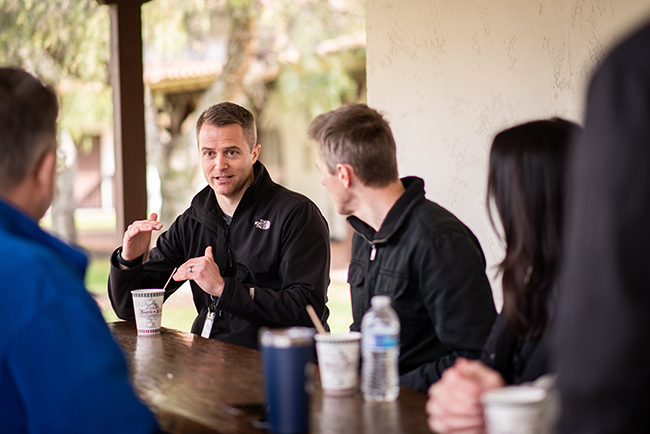
By Ken Braddy
A group of pastors and church leaders have a conversation about what it’s like recruiting leaders in the normative-sized church.
What are some of the unique giftings and challenges of recruiting group leaders in a normative-sized church? Ken Braddy, Lifeway’s Director of Sunday School, recently had a conversation with four pastors of normative churches (those with 50-150 people in attendance) on the podcast Disciple-making in Community. Here’s a look at their conversation.
What’s your favorite part about pastoring a normative-sized church?
Chris Johnson, pastor of Grace Church, Hendersonville, Tennessee:
You get to know the people. It’s small enough you can make those connections.
Tod Tanner, vice president of the Tennessee Baptist Foundation:
It creates a sense of family. You get to know the people, but even within that, as you get to know them, you go on a journey with them. You’re truly family. And I contend we still need family.
Ron Brown, pastor of Crestmont Baptist Church, Burleson, Texas:
You have the opportunity to know each other at a deeper level, which I think is wonderful and unsettling for some. We know one another’s struggles, heartaches, family dynamics, and stories. And as a shepherd, I’m able to better know the sheep.
Brian Gass, pastor of First Baptist Howell, Tennessee:
We keep it real. There’s no faking it. Everybody knows your life throughout the week, so you don’t show up to church on Sunday and become somebody else. We have folks from just about all walks of life. But we just love each other like a family.
What are some of the unique challenges of recruiting leaders in your size church?
Tod Tanner:
One of the main things you need is high intentionality. When you have guests come in, don’t just walk up to them and hand them a Sunday School book and say, “Hey, the Lord’s laid you on my heart.” Rather, be highly intentional when you see a guest. There are guests in the area. There are ways to reach out and try to find new folks. But one of the biggest challenges is being highly intentional with guests to the church and trying to enlist them for leadership.
Chris Johnson:
There just aren’t a lot of options. It’s a small number of people who can potentially lead a group. There are individuals who rise up, and it’s a matter of seeing if you can work with their schedules and what’s going on in their lives. And you have to be creative to find those solutions.
Ron Brown:
Our biggest challenge by far is leaders being spread too thin. If we’re going to recruit new leaders, it almost always involves robbing Peter to pay Paul. We’re going to take someone away from another area of service in order to meet this need over here.
Chris Johnson:
We are a church plant. We’re at the beginning stage of helping people understand the importance of being a part of a group. Communicating and helping people understand the importance and the value of groups is a significant part of what we’re doing at this point.
Are there any particular ways you guys have overcome some of the challenges? Are there ways you have found to help overcome objections or people’s concerns about stepping into a leadership role?
Tod Tanner:
Recruiting leaders is a great opportunity to be able to teach and push toward Romans 12, which lists spiritual gifts. If it’s a normative-sized church, one person is unable to do it all. We can stand on the truth of what God has said, push into Romans 12, push into Ephesians 4—that’s the equipping of the saints.
The job of the pastor is not to do all the work of the ministry but rather to equip the saints for the work of the ministry. When we stand on God’s Word, we’re truly on the solid rock foundation to be able to address the issues.
Ron Brown:
We have to ask ourselves what is of primary importance. The normative church has to do a few things really well instead of trying to do several mediocre things.
“The normative-sized church has to do a few things really well instead of trying to do several mediocre things.” — Ron Brown Click To TweetSo we have to look at Scripture and ask: What are the priorities God has given to the church that are absolutely necessary? Then we have to ask: What is God doing in our church? Who’s He given us? What gifts has He given our people? Are we allowing people to use those gifts in a way they can flourish? We can’t do everything. What must we do?
I want to shift gears and think about the future. Think about the recruiting we used to do before the pandemic and what we’ve been doing up to this point. Is it going to be a little easier, or is it going be a little harder to recruit people in the normative-sized church as we go forward?
Brian Gass:
The biggest challenge I see there is the generational challenge. The younger generation has a different view of the church and what the church adds to their life or doesn’t add to their life. There’s certainly less of a sense of duty to be involved in the church and to find the place to plug in.
You won’t have folks who stick in there with a job just because they’ve always worn that mantle. But when they do commit, they’re all in.
So I’ve taken the pressure off myself about things continuing to exist. They don’t have to continue to exist the way they are. God can do a new thing, and that means an old thing may have to die.
What final words of encouragement or advice would you have for someone recruiting leaders in a normative church?
Chris Johnson:
Know what God has called you to do, and know your people and community. Don’t lose heart. Just keep going. Don’t stop. There are going to be some twists and turns along the way, but stay faithful. Hang in there.
Brian Gass:
Along those lines, it’s not all on you. Your shoulders aren’t broad enough to carry the church. It’s Jesus’s church, and revival is always just one breath of the Holy Spirit away. So we pray for that.
“Your shoulders aren't broad enough to carry the church. It's Jesus's church, and revival is always just one breath of the Holy Spirit away.” — Brian Gass Click To TweetTod Tanner:
Make sure you don’t get into the comparative game. Jesus recruited 12. He graduated 11. And He focused on three. And we’re still learning from those three today. He didn’t necessarily pastor a megachurch. To the pastor at the normative church, know God has called you there and is using you in tremendous ways.
Ron Brown:
Preach the gospel to yourself. Remind yourself God’s acceptance of you is not based on how much you do or how successful you feel like you are. Keep your eyes on Christ and what He has done. It’s essential for me to remind myself success is in my faithfulness to Christ and bringing him glory.
For permission to republish this article, contact Marissa Postell Sullivan.

Ken Braddy
Ken is Lifeway’s director of Sunday School. He is the author of 11 books on group ministry, including Breakthrough: Creating a New Scorecard for Group Ministry Success. He also hosts a group ministry podcast, Disciple-making in Community. Follow his group ministry blog at kenbraddy.com.
Hear more of this conversation on the Disciple-making in Community podcast.












